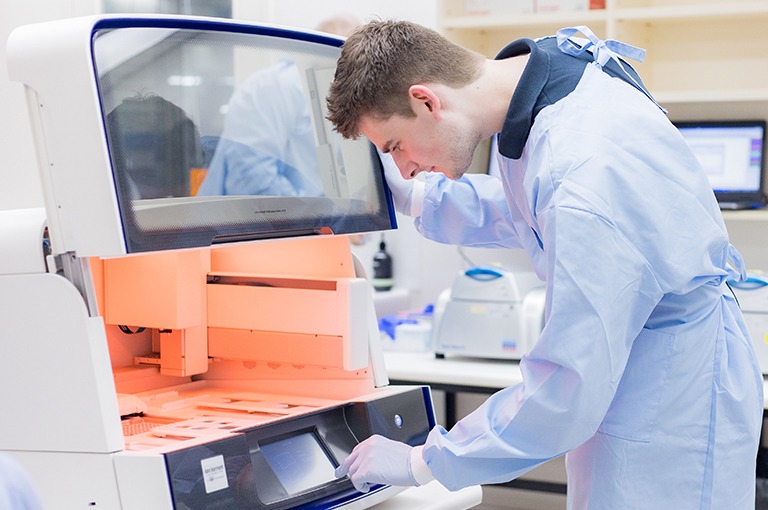
Sheep Genetic Testing
Optimise your flock with genotyping. Identify crucial genetic characteristics to drive flock productivity, profitability and sustainability.
What you see is not always what you get. Genotyping technology can accurately assign Sire and Dam as well as identify important genetic characteristics that would otherwise go undetected, driving flock productivity, profitability and sustainability through industry-informed DNA analysis. The XytoVet 50K genotypes feed directly into the MLA Sheep Genetics database for analysis to provide industry-backed parent verification and genomic breeding values.
As the only wholly Australian-owned and operated livestock genotyping service, we have a unique understanding of the local sheep industry and are passionate about strengthening its genetic makeup. Discover how our DNA analysis services can help improve your flock.
Benefits to your sheep
Accurate parent verification is the easiest and most cost-effective way to improve flock performance. Genetic parent verification can help you make informed choices around the top and bottom contributors. As leading experts in the manipulation and analysis of DNA, our genotyping services can significantly impact your breeding and bloodstock selection.
- Identify correct parental lineage
- Accurate genomic evaluation and monitoring of major genes
- Enhance breeder assignment and mating design
- Improve flock performance

Sheep Parentage Testing
DNA technology is the only way to accurately determine a sheep’s true parentage without spending all night in a paddock during lambing. Every single animal carries two copies of each gene, one inherited from the dam and the other from the sire. Using our genotyping method, we can determine whether a specific dam or sire is the true biological parent or not.
Errors in parentage assignments have a year-on-year cumulative negative impact on your flock, with some DNA-based parentage tools found to be inaccurate as much as 80% of the time. At XytoVet we make use of multiple genetic markers for sheep parentage testing and sheep ovine genotyping.
Other applications associated with DNA testing include:
- Confirmation of semen identity
- Breeding and bloodstock registries
- Multiple-sire mating
- Parentage testing

Ovine Genotyping
At XytoVet, we use custom designed ThermoFisher Scientific 50K Ovine Genotyping Arrays for Ovine Genotyping.
These state-of-the-art arrays allow us to deal with a wide range of applications in Ovine breeding, including identifying parental lineage, accurate genomic evaluations and monitoring of major genes, breed assignment and mating design. The small array has 11,000 markers, which facilitate highly accurate imputation up to a higher density panel (e.g 50k), while the 50K array provides additional resolution where required.
Thermofisher’s arrays also allow for early detection of abnormalities, enabling the identification of animals that are not suitable as stud animals.
Features:
- Expert design developed in collaboration with Donagh Berry at Teagasc, Animal and Grassland Research and Innovation centre.
- High-quality SNPs, excellent call and concordance rates across platforms and laboratories.
- Compatible with sheep consortium 15k arrays and with other previous studies.

Flock profile testing
Simple strategies can drive huge improvements in productivity. A great tool for commercial Merino producers, profile testing allows you to see how your flock is performing compared to the rest of the industry and evaluate your ram team’s genetic merit.
A flock profile test can give commercial Merino breeders an idea of how the genetics of a flock compare to the rest of the industry. This is done through a random sample of 20 animals to represent your flock. The data generated from this sample is then compared to Sheep Genetics’ data, and the results are expressed as ASBVs, benchmarked against the industry.

Get In Touch
Discover how DNA analysis of your flock can drive your farm’s productivity, profitability and sustainability. Get in touch with us to learn more about the genetic makeup of your livestock so you can make informed, strategic decisions about your operations going far into the future.
Submit your enquiry using the form below, and our friendly team will reach out as soon as possible.

About Us
We pride ourselves on conducting all of our operations, including our testing, in Australia. This avoids arduous international testing turnarounds and means we offer localised expertise and sheep industry knowledge.
- The only 100% Australian-owned and operated DNA genotyping business
- Over 30 years of industry experience in the Australian agricultural industry
- Bespoke solutions to suit the needs of you and your cattle
- Australian leaders in DNA technology and 100% onshore testing
- Dedicated to our customers and sharing our knowledge with them
Discover more ways XytoVet can boost your breeding programs through our range of health diagnostics and analysis capabilities.
Frequently Asked Questions
-
What is sheep genotyping?
The process of finding differences in the genetic makeup of individual sheep within their DNA sequences is called genotyping.
DNA is mapped by finding the combination of single nucleotides that make up the DNA or the genome. The genome is the complete map of the individual’s DNA. These single nucleotide polymorphisms (SNPs) show the differences between your sheep across the genome. At each SNP there are two alleles, one from each parent, which indicate differences between sheep.
You can learn more about sheep genotyping on the Sheep Genetics website or get in touch with our team.
-
What are Australian Sheep Breeding Values?
Australian sheep breeding values (ASBVs) allow you to predict the genetics each animal will pass on to their progeny. These genotypes estimate how related your animals are to the rest of the animals in the evaluation.
Breeding values are estimated based on the traits recorded for an animal and its relatives. Therefore, if your animals are related to genotyped animals in the database, these related animals will contribute information to your animal’s breeding values. If there is enough information to estimate an accurate breeding value, it will be reported as an ASBV. These relationships are important for traits that are hard or expensive to measure, such as eating quality, traits measured in adults, and disease traits.
Discover how to improve your flock with ASBVs. Get in touch with the XytoVet team today.
-
Which breeds can utilise genotyping?
These breeds have sufficient data in the reference population for accurate genotyping:
- Merino
- White Suffolk
- Poll Dorset
- Border Leicester
- Composite Maternal
- Coopworth
- Corriedale
- Dorper
- White Dorper
- Hampshire Down
- Southdown
- Suffolk
- Texel
Because there is more data from some breeds than others in the database, the benefit of genotyping varies. Contact us to discuss the suitability of your breed.
-
How do I use DNA analysis when buying rams?
Improving your flock’s performance with enhanced breeding values starts with setting your breeding objectives. You will also need to understand estimated breeding values and selection indexes. Knowing your way around the Sheep Genetics website is a good start.
Ready to apply genomic knowledge to purchase your next high-performing ram? Get in touch with the XytoVet team to get started.
-
What is an SNP?
A Single Nucleotide Polymorphism (SNP) is a common genetic variation that occurs within a DNA molecule. It is a difference in a single letter of the genetic code that makes up an animal’s DNA. For example, one animal may have a “C” at a certain position in their DNA, while another animal may have a “T” at the same position.
SNPs can have important implications for livestock farming, as they can be associated with specific traits or conditions that affect the health and productivity of the animals. By analyzing the DNA of their animals for SNPs, farmers can identify genetic markers associated with desirable traits such as growth rate, milk production, and disease resistance.
The analysis of SNPs can be performed using the ThermoFisher microarrays, which allow for the analysis of thousands of SNPs simultaneously, providing a comprehensive genetic profile of the animal.
By identifying specific SNPs associated with desirable traits, farmers can make informed breeding decisions that optimize the health and productivity of their animals. This can lead to increased profitability for the farm and better quality products for the market.
Overall, understanding SNPs is an important part of modern livestock farming, and farmers who are knowledgeable about genetic testing can use this information to make informed decisions that optimize the health and productivity of their animals. By incorporating SNP analysis into their management practices, farmers can stay ahead of potential health problems and produce high-quality products that meet the demands of the market.
-
What is Single Step Analysis
Single step genomic analysis is a method of analyzing the genetic makeup of livestock, to improve their breeding and production potential.
Traditionally, farmers have relied on pedigree records and physical traits to select breeding animals. However, with single step genomic analysis, farmers can now use DNA testing to get a more accurate and reliable picture of an animal’s genetic potential.
This process involves collecting a sample of an animal’s DNA. The DNA is then analyzed to identify specific markers or variations in the animal’s genetic code, known as single nucleotide polymorphisms (SNPs).
Using the SNP information, scientists can estimate the animal’s genetic merit for various production traits such as meat quality, and disease resistance. This information is then combined with other performance records such as weight gain, milk production, and health records in a single step to produce a more accurate and reliable estimate of the animal’s genetic potential.
By using single step genomic analysis, farmers can identify the best breeding animals earlier in life, reduce the time and cost associated with traditional breeding methods, and improve the overall quality and productivity of their herds or flocks.
-
What is DNA?
DNA is a complex molecule that carries the genetic information of living organisms, including livestock. It contains the instructions that determine an animal’s physical characteristics, behavior, and health.
For farmers, understanding the role of DNA in their animals is important for making informed breeding decisions and improving the productivity of their herds or flocks. DNA can be analyzed to identify specific genetic markers or variations that are associated with desirable traits such as milk production, meat quality, and disease resistance.
DNA is composed of four chemical building blocks called nucleotides, represented by the letters A, T, C, and G. These nucleotides pair up with each other in a specific way, forming a double helix structure that is the backbone of the DNA molecule.
By analyzing the DNA of their animals, farmers can make informed decisions about which animals to breed together to produce offspring with desirable traits. This can lead to increased productivity and profitability for the farm.
In addition to identifying desirable traits, DNA analysis can also be used to identify genetic disorders or diseases that may be present in the herd or flock. By identifying these genetic markers, farmers can test their animals for the disease and take appropriate measures to prevent its spread.
Understanding DNA is an important part of modern livestock farming, and farmers who are knowledgeable about DNA analysis can use this information to make informed decisions that optimize the health and productivity of their animals. By incorporating DNA analysis into their management practices, farmers can stay ahead of potential health problems and produce high-quality products that meet the demands of the market.
-
What is 50K Genomic Analysis?
The 50k genomic analysis is an advanced genetic testing method that can provide valuable insights into the genetic makeup of livestock, specifically for farmers. This analysis examines approximately 50,000 genetic markers, known as Single Nucleotide Polymorphisms (SNPs), within the DNA of animals.
By utilizing the 50k genomic analysis, farmers can gain a comprehensive understanding of the genetic traits and potential of their livestock. This analysis helps identify specific genetic markers associated with traits such as milk production, meat quality, disease resistance, and more.
The process involves collecting DNA samples from animals, typically using a tissue sampler or blood. These samples are then analyzed using specialized laboratory techniques to identify and assess the SNPs.
The information obtained from the 50k genomic analysis allows farmers to make informed decisions when it comes to breeding selection. By identifying animals with desirable genetic traits, farmers can selectively breed them together to produce offspring with improved qualities and productivity.
Furthermore, the 50k genomic analysis aids in identifying genetic disorders or diseases that may be present in the herd. By detecting specific SNPs associated with diseases, farmers can take preventive measures and develop targeted management strategies to minimize the impact on the overall health and well-being of their livestock.
By incorporating 50k genomic analysis into their farming practices, farmers can optimize their breeding programs, enhance the quality and productivity of their livestock, and improve the overall success and profitability of their farming operations.
At XytoVet.com.au, we offer comprehensive 50k genomic analysis services tailored to the needs of farmers. Our advanced genetic testing methods and expert analysis can provide valuable insights to help you make data-driven decisions for the optimization of your livestock’s genetic potential.










